新概念英语第一册第 113-114 课 (共30张PPT)
文档属性
| 名称 | 新概念英语第一册第 113-114 课 (共30张PPT) | 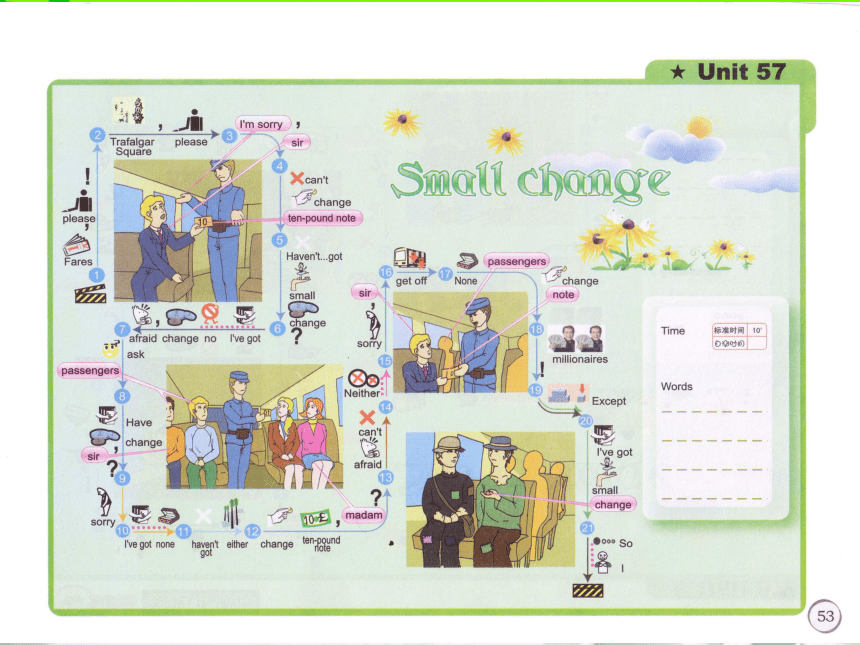 | |
| 格式 | ppt | ||
| 文件大小 | 3.3MB | ||
| 资源类型 | 教案 | ||
| 版本资源 | 新概念英语 | ||
| 科目 | 英语 | ||
| 更新时间 | 2023-10-06 16:51:57 | ||
图片预览

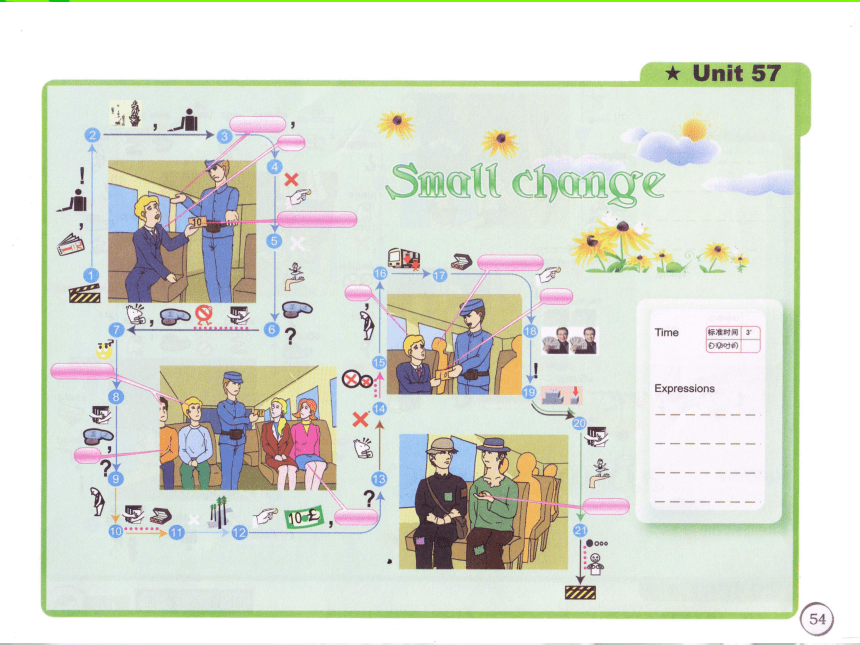
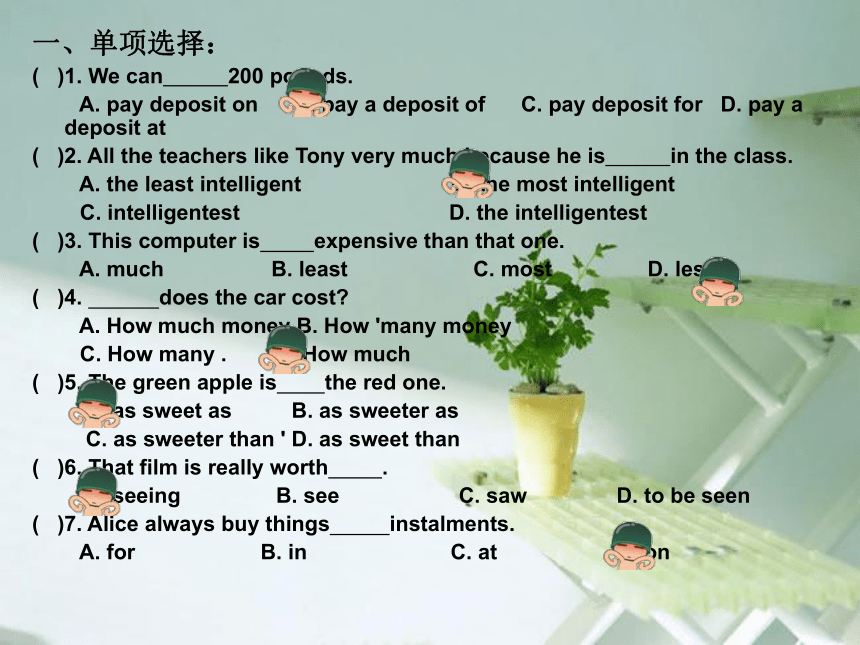
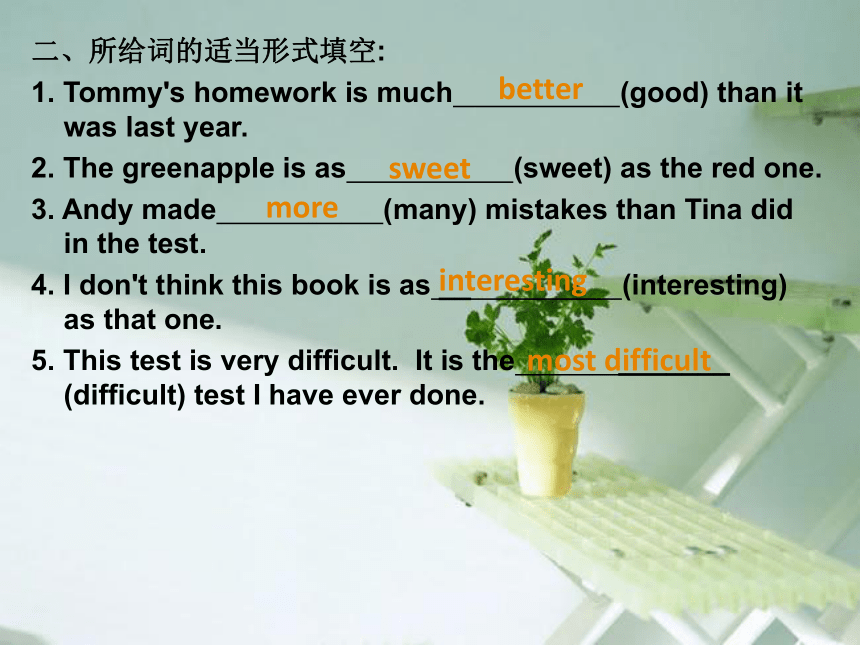
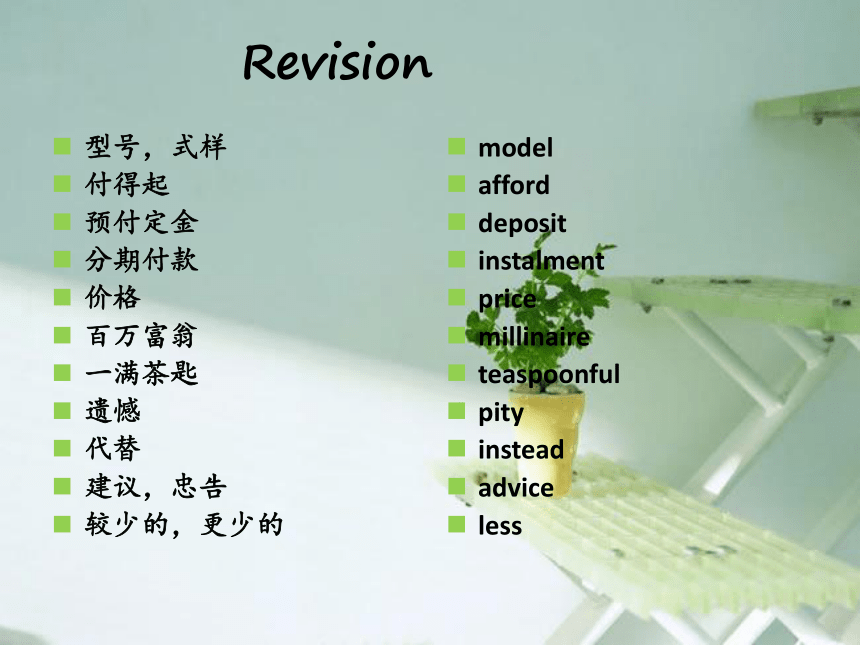
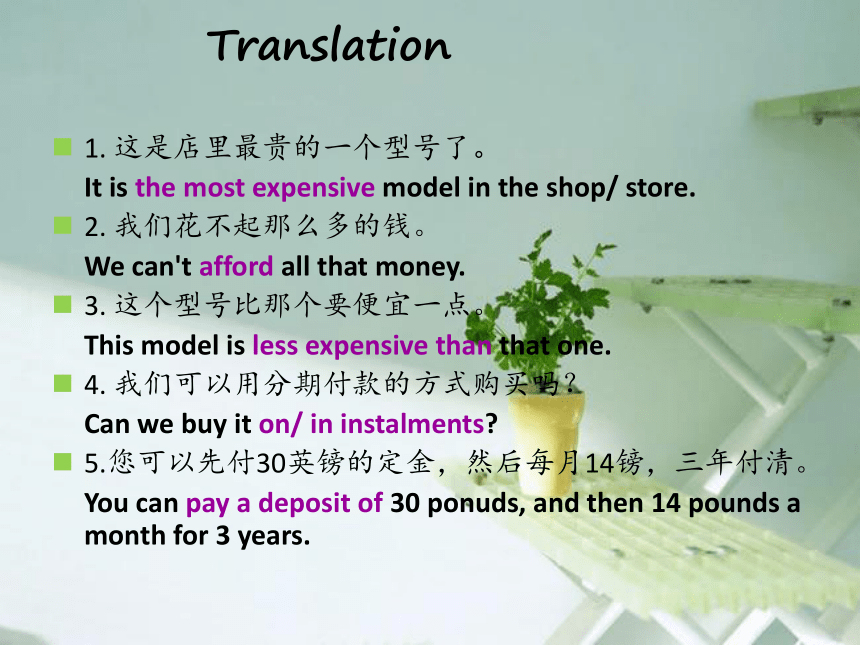
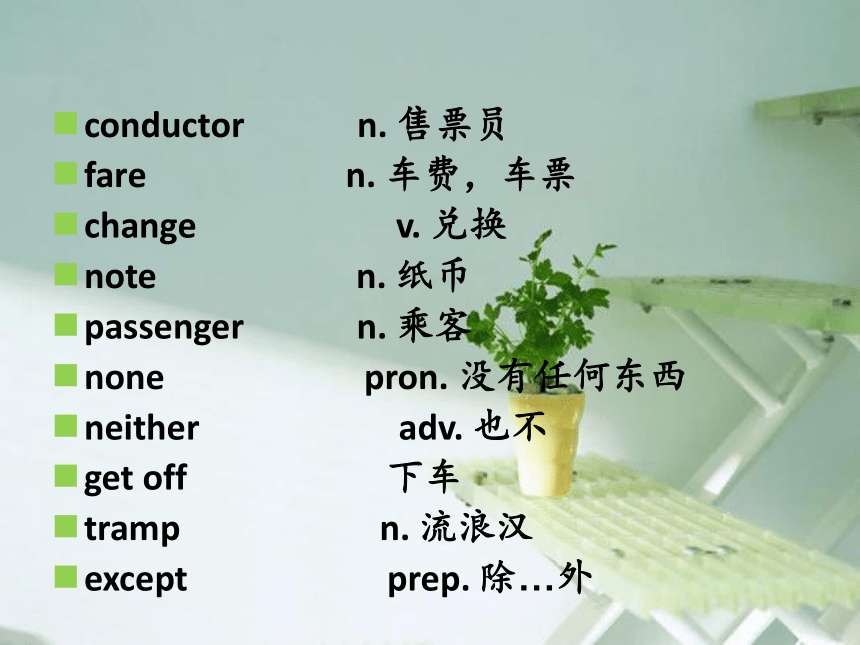
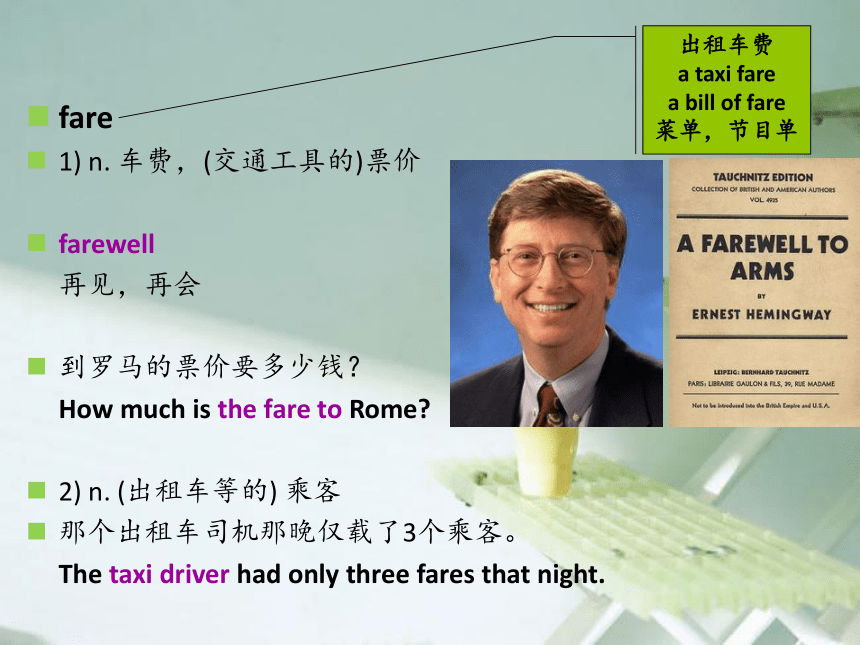
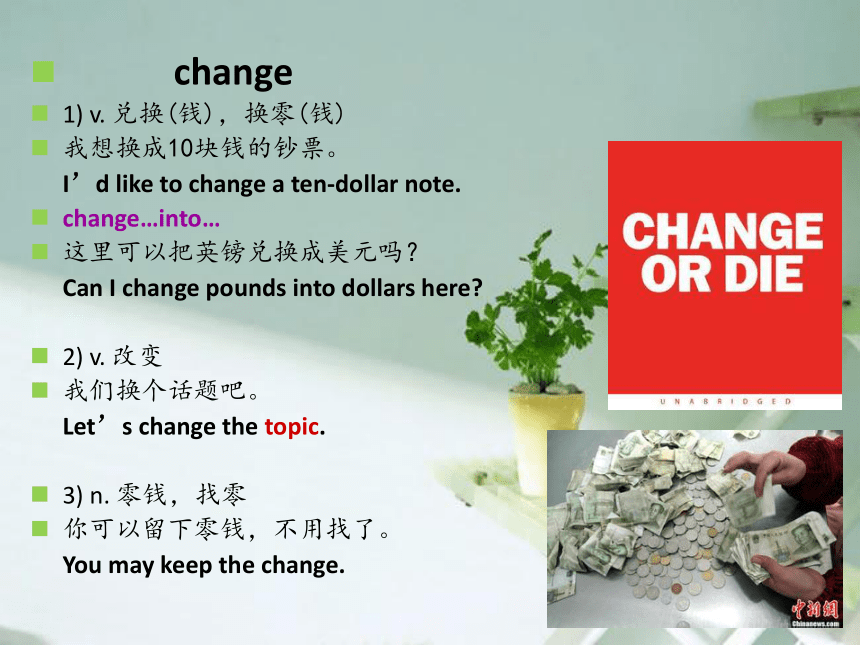
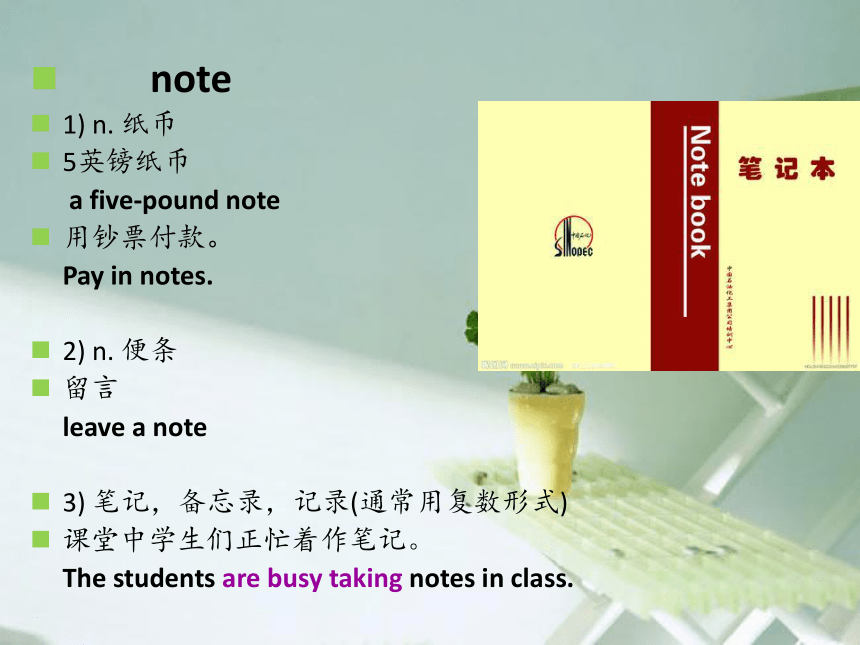
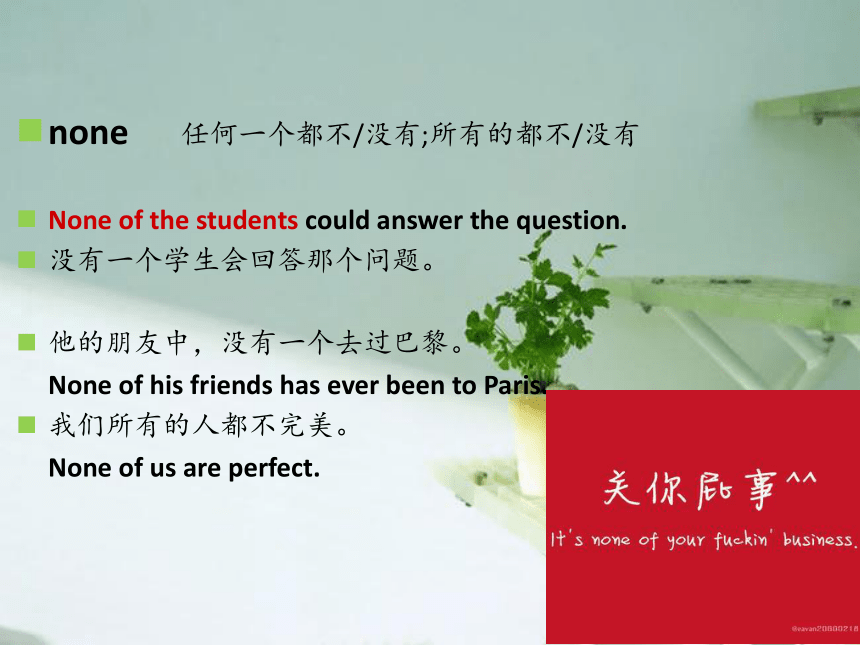
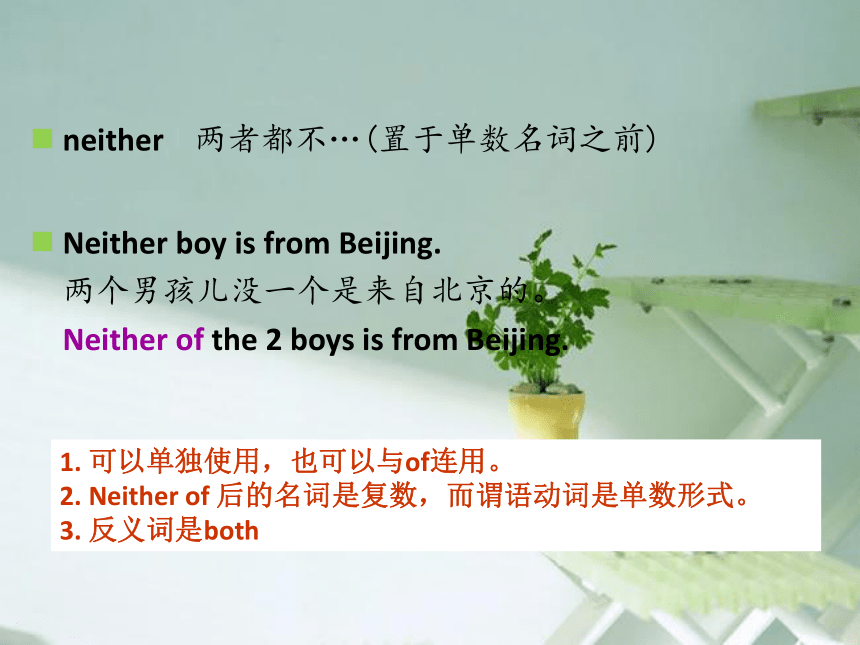
文档简介
(共30张PPT)
一、单项选择:
( )1. We can 200 pounds.
A. pay deposit on B. pay a deposit of C. pay deposit for D. pay a deposit at
( )2. All the teachers like Tony very much because he is in the class.
A. the least intelligent B. the most intelligent
C. intelligentest D. the intelligentest
( )3. This computer is expensive than that one.
A. much B. least C. most D. less
( )4. does the car cost
A. How much money B. How 'many money
C. How many . D. How much
( )5. The green apple is the red one.
A. as sweet as B. as sweeter as
C. as sweeter than ' D. as sweet than
( )6. That film is really worth .
A. seeing B. see C. saw D. to be seen
( )7. Alice always buy things instalments.
A. for B. in C. at D. on
二、所给词的适当形式填空:
1. Tommy's homework is much (good) than it was last year.
2. The greenapple is as (sweet) as the red one.
3. Andy made (many) mistakes than Tina did in the test.
4. I don't think this book is as __ (interesting) as that one.
5. This test is very difficult. It is the _______ (difficult) test I have ever done.
better
sweet
more
interesting
most difficult
型号,式样
付得起
预付定金
分期付款
价格
百万富翁
一满茶匙
遗憾
代替
建议,忠告
较少的,更少的
model
afford
deposit
instalment
price
millinaire
teaspoonful
pity
instead
advice
less
Revision
Translation
1. 这是店里最贵的一个型号了。
It is the most expensive model in the shop/ store.
2. 我们花不起那么多的钱。
We can't afford all that money.
3. 这个型号比那个要便宜一点。
This model is less expensive than that one.
4. 我们可以用分期付款的方式购买吗?
Can we buy it on/ in instalments
5.您可以先付30英镑的定金,然后每月14镑,三年付清。
You can pay a deposit of 30 ponuds, and then 14 pounds a month for 3 years.
conductor n. 售票员
fare n. 车费,车票
change v. 兑换
note n. 纸币
passenger n. 乘客
none pron. 没有任何东西
neither adv. 也不
get off 下车
tramp n. 流浪汉
except prep. 除…外
fare
1) n. 车费,(交通工具的)票价
farewell
再见,再会
到罗马的票价要多少钱?
How much is the fare to Rome
2) n. (出租车等的) 乘客
那个出租车司机那晚仅载了3个乘客。
The taxi driver had only three fares that night.
出租车费
a taxi fare
a bill of fare
菜单,节目单
change
1) v. 兑换(钱),换零(钱)
我想换成10块钱的钞票。
I’d like to change a ten-dollar note.
change…into…
这里可以把英镑兑换成美元吗?
Can I change pounds into dollars here
2) v. 改变
我们换个话题吧。
Let’s change the topic.
3) n. 零钱,找零
你可以留下零钱,不用找了。
You may keep the change.
note
1) n. 纸币
5英镑纸币
a five-pound note
用钞票付款。
Pay in notes.
2) n. 便条
留言
leave a note
3) 笔记,备忘录,记录(通常用复数形式)
课堂中学生们正忙着作笔记。
The students are busy taking notes in class.
none 任何一个都不/没有;所有的都不/没有
None of the students could answer the question.
没有一个学生会回答那个问题。
他的朋友中,没有一个去过巴黎。
None of his friends has ever been to Paris.
我们所有的人都不完美。
None of us are perfect.
neither 两者都不…(置于单数名词之前)
Neither boy is from Beijing.
两个男孩儿没一个是来自北京的。
Neither of the 2 boys is from Beijing.
1. 可以单独使用,也可以与of连用。
2. Neither of 后的名词是复数,而谓语动词是单数形式。
3. 反义词是both
except prep. 除…之外
除了约翰以外大家都能回答。
Everybody can answer, except John.
except for 除…以外,要不是
这部电影除了结尾之外都很好。
The movie was good except for the ending.
除了……之外
besides
除了……之外
except 和 besides 都可以表示"除了……之外"的意思,但是二者有什么区别呢?
The people in the classroom are all students, except Peter.
Besides Peter, the students in the classroom are also from SQ.
二者的区别在于,except不包括所除外的人或物,而besides则包括所除外的人或物。
2) I'm sorry to hear that. 听到这个消息我感到很遗憾.
3) 复合形容词
两个或多个词用连字符连接构成
只能用原形
只用于修饰名词(做定语)
eg:He is a three-year-old boy.
I heve a second-hand bike.
4) 否定疑问句
否定词开头
"难道不......"
eg:她难道不漂亮吗?
Isn't she beautiful
他没有足够的钱吗?
Doesn't he have enough money
5)no+名词
=not...any+名词
eg:I have no money.
= I don't have any money.
There is no water.
= There isn't any water.
6)afraid adj. 害怕的
be afraid +to do sth.
be afraid +(that)句子 害怕做某事
7) 也
either
too
also
as well
否定句 句末
肯定句 句末
肯定句 句中 (be/助/情后或实义前)
=too
8) neither +谓语+主语 表示主语也不
Jim can't swim,neither can I.
Jim isn't good at English,neither am I.
Jim doesn't like red,neither do I.
so+谓语+主语 表示主语也是
Jim can swim,so can I.
Jim is good at English,so am I.
Jim likes red,so do I.
=either
=too
9) hundred thousand million billion
百
千
百万
十亿
数字+hundred
hundreds of
几百
数以百计的
[ θa z nd]
['milj n]
[ bilj n]
练习(用neither改写)
1. I don’t want any tea.
- Neither do I.
2. I wasn’t tired this morning.
- Neither was I.
3. I can’t speak French.
- Neither can I.
4. I didn’t buy a new car last year.
- Neither did I.
5. I haven’t got a headache.
- Neither have I.
练习用so改写
1. I want some coffee.
- So do I.
2. I was at the party last night.
- So was I.
3. I can swim very well.
- So can I.
4. I saw George last night.
- So did I.
5. I have got a cold.
- So have I.
so, neither引导的简短回答
以so,neither引导的简短回答,必须用倒装形式.
So/ Neither+助动词/be动词/情态动词+主语.
假如前一句是肯定的,后一句用so开头,
假如前一句是否定句,后一句用neither/nor开头,
前后句的时态要保持一致.
1.I'm hungry.
So am I.=I am hungry, too.
2.I want some coffee.
So do I.
3.I'm not tired.
Neither am I.=I am not tired, either.
4.I don't want any tea.
Nor do I.
I often play games.
I made a cake.
I have got an apple.
I can draw a horse.
I am watering the flowers.
I can’t swim.
I don’t like apples.
A Neither can I.
B. So can I .
C. So did I.
D. So am I.
E. Neither do I.
F. So have I .
G. So do I.
Practice3—so与 neither
1.I am hunry.
________________
So am I.
2.I was at the party last night.
_____________________
So was I.
3.I can swim very well.
_____________________
So can I.
4.I`m not tired.
_____________________
Neither am I.
5.I don`t want any tea.
_____________________
Neither do I.
Practice3—so与 neither
6.I can`t speak Chinese.
________________
Neither can I.
7.I didn`t buy a new car last year.
_____________________
Neither did I.
8.I`ve got a cold.
_____________________
So have I
9.I haven`t got a headache.
_____________________
Neither have I.
5.I want any tea.
_____________________
So do I.
练习(用neither/so改写)
1. I don’t want any tea.
- Neither do I.
2. I wasn’t tired this morning.
- Neither was I.
3. I can speak French.
- So can I.
4. I didn’t buy a new car last year.
- Neither did I.
5. I have got a headache.
- So have I.
test
一、单项选择:
( )1. We can 200 pounds.
A. pay deposit on B. pay a deposit of C. pay deposit for D. pay a deposit at
( )2. All the teachers like Tony very much because he is in the class.
A. the least intelligent B. the most intelligent
C. intelligentest D. the intelligentest
( )3. This computer is expensive than that one.
A. much B. least C. most D. less
( )4. does the car cost
A. How much money B. How 'many money
C. How many . D. How much
( )5. The green apple is the red one.
A. as sweet as B. as sweeter as
C. as sweeter than ' D. as sweet than
( )6. That film is really worth .
A. seeing B. see C. saw D. to be seen
( )7. Alice always buy things instalments.
A. for B. in C. at D. on
二、所给词的适当形式填空:
1. Tommy's homework is much (good) than it was last year.
2. The greenapple is as (sweet) as the red one.
3. Andy made (many) mistakes than Tina did in the test.
4. I don't think this book is as __ (interesting) as that one.
5. This test is very difficult. It is the _______ (difficult) test I have ever done.
better
sweet
more
interesting
most difficult
型号,式样
付得起
预付定金
分期付款
价格
百万富翁
一满茶匙
遗憾
代替
建议,忠告
较少的,更少的
model
afford
deposit
instalment
price
millinaire
teaspoonful
pity
instead
advice
less
Revision
Translation
1. 这是店里最贵的一个型号了。
It is the most expensive model in the shop/ store.
2. 我们花不起那么多的钱。
We can't afford all that money.
3. 这个型号比那个要便宜一点。
This model is less expensive than that one.
4. 我们可以用分期付款的方式购买吗?
Can we buy it on/ in instalments
5.您可以先付30英镑的定金,然后每月14镑,三年付清。
You can pay a deposit of 30 ponuds, and then 14 pounds a month for 3 years.
conductor n. 售票员
fare n. 车费,车票
change v. 兑换
note n. 纸币
passenger n. 乘客
none pron. 没有任何东西
neither adv. 也不
get off 下车
tramp n. 流浪汉
except prep. 除…外
fare
1) n. 车费,(交通工具的)票价
farewell
再见,再会
到罗马的票价要多少钱?
How much is the fare to Rome
2) n. (出租车等的) 乘客
那个出租车司机那晚仅载了3个乘客。
The taxi driver had only three fares that night.
出租车费
a taxi fare
a bill of fare
菜单,节目单
change
1) v. 兑换(钱),换零(钱)
我想换成10块钱的钞票。
I’d like to change a ten-dollar note.
change…into…
这里可以把英镑兑换成美元吗?
Can I change pounds into dollars here
2) v. 改变
我们换个话题吧。
Let’s change the topic.
3) n. 零钱,找零
你可以留下零钱,不用找了。
You may keep the change.
note
1) n. 纸币
5英镑纸币
a five-pound note
用钞票付款。
Pay in notes.
2) n. 便条
留言
leave a note
3) 笔记,备忘录,记录(通常用复数形式)
课堂中学生们正忙着作笔记。
The students are busy taking notes in class.
none 任何一个都不/没有;所有的都不/没有
None of the students could answer the question.
没有一个学生会回答那个问题。
他的朋友中,没有一个去过巴黎。
None of his friends has ever been to Paris.
我们所有的人都不完美。
None of us are perfect.
neither 两者都不…(置于单数名词之前)
Neither boy is from Beijing.
两个男孩儿没一个是来自北京的。
Neither of the 2 boys is from Beijing.
1. 可以单独使用,也可以与of连用。
2. Neither of 后的名词是复数,而谓语动词是单数形式。
3. 反义词是both
except prep. 除…之外
除了约翰以外大家都能回答。
Everybody can answer, except John.
except for 除…以外,要不是
这部电影除了结尾之外都很好。
The movie was good except for the ending.
除了……之外
besides
除了……之外
except 和 besides 都可以表示"除了……之外"的意思,但是二者有什么区别呢?
The people in the classroom are all students, except Peter.
Besides Peter, the students in the classroom are also from SQ.
二者的区别在于,except不包括所除外的人或物,而besides则包括所除外的人或物。
2) I'm sorry to hear that. 听到这个消息我感到很遗憾.
3) 复合形容词
两个或多个词用连字符连接构成
只能用原形
只用于修饰名词(做定语)
eg:He is a three-year-old boy.
I heve a second-hand bike.
4) 否定疑问句
否定词开头
"难道不......"
eg:她难道不漂亮吗?
Isn't she beautiful
他没有足够的钱吗?
Doesn't he have enough money
5)no+名词
=not...any+名词
eg:I have no money.
= I don't have any money.
There is no water.
= There isn't any water.
6)afraid adj. 害怕的
be afraid +to do sth.
be afraid +(that)句子 害怕做某事
7) 也
either
too
also
as well
否定句 句末
肯定句 句末
肯定句 句中 (be/助/情后或实义前)
=too
8) neither +谓语+主语 表示主语也不
Jim can't swim,neither can I.
Jim isn't good at English,neither am I.
Jim doesn't like red,neither do I.
so+谓语+主语 表示主语也是
Jim can swim,so can I.
Jim is good at English,so am I.
Jim likes red,so do I.
=either
=too
9) hundred thousand million billion
百
千
百万
十亿
数字+hundred
hundreds of
几百
数以百计的
[ θa z nd]
['milj n]
[ bilj n]
练习(用neither改写)
1. I don’t want any tea.
- Neither do I.
2. I wasn’t tired this morning.
- Neither was I.
3. I can’t speak French.
- Neither can I.
4. I didn’t buy a new car last year.
- Neither did I.
5. I haven’t got a headache.
- Neither have I.
练习用so改写
1. I want some coffee.
- So do I.
2. I was at the party last night.
- So was I.
3. I can swim very well.
- So can I.
4. I saw George last night.
- So did I.
5. I have got a cold.
- So have I.
so, neither引导的简短回答
以so,neither引导的简短回答,必须用倒装形式.
So/ Neither+助动词/be动词/情态动词+主语.
假如前一句是肯定的,后一句用so开头,
假如前一句是否定句,后一句用neither/nor开头,
前后句的时态要保持一致.
1.I'm hungry.
So am I.=I am hungry, too.
2.I want some coffee.
So do I.
3.I'm not tired.
Neither am I.=I am not tired, either.
4.I don't want any tea.
Nor do I.
I often play games.
I made a cake.
I have got an apple.
I can draw a horse.
I am watering the flowers.
I can’t swim.
I don’t like apples.
A Neither can I.
B. So can I .
C. So did I.
D. So am I.
E. Neither do I.
F. So have I .
G. So do I.
Practice3—so与 neither
1.I am hunry.
________________
So am I.
2.I was at the party last night.
_____________________
So was I.
3.I can swim very well.
_____________________
So can I.
4.I`m not tired.
_____________________
Neither am I.
5.I don`t want any tea.
_____________________
Neither do I.
Practice3—so与 neither
6.I can`t speak Chinese.
________________
Neither can I.
7.I didn`t buy a new car last year.
_____________________
Neither did I.
8.I`ve got a cold.
_____________________
So have I
9.I haven`t got a headache.
_____________________
Neither have I.
5.I want any tea.
_____________________
So do I.
练习(用neither/so改写)
1. I don’t want any tea.
- Neither do I.
2. I wasn’t tired this morning.
- Neither was I.
3. I can speak French.
- So can I.
4. I didn’t buy a new car last year.
- Neither did I.
5. I have got a headache.
- So have I.
test
同课章节目录
